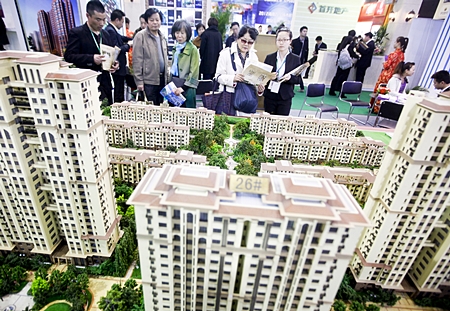Property prices in China will dip this year but a tumble is unlikely, according to a report recently released by the China Academy of Social Sciences.
Sluggish demand has ruled out big price increases while property developers are unlikely to slash prices because of high land costs, says the academy’s annual report on real estate.
“Property sales will remain low this year, despite a rebound since March, and prices will dip,” said Li Enping, associate professor at the Institute for Urban and Environmental Studies under the academy, a major contributor to the report.
 People look at models of new residential developments for sale at a real estate fair in Beijing, China. (EPA/Diego Azubel)
People look at models of new residential developments for sale at a real estate fair in Beijing, China. (EPA/Diego Azubel)
Property prices in small and medium cities that have increased recently will experience the biggest fall, according to the report. And any dip in prices should, eventually, stimulate sales, due to the rapid urbanisation process.
Home prices in key cities, such as Beijing and Shanghai, will only fall marginally even though sales may be sluggish, the report claimed.
With a slew of rigorous measures in place, including tighter lending policies, higher down payments and a ban on third-home purchases, the property market has entered a period of cooling.
Out of 70 major cities tracked by the government, 46 recorded a year-on-year price fall in April, eight more than in March, the National Bureau of Statistics showed.
“Policy fine-tuning has been taking place and the worst time for property developers is, in fact, over,” Zhang Hanya, chairman of the Investment Association of China, said. Zhang is a former director of the Investment Research Institution with the National Development and Reform Commission.
More than 30 local governments have introduced measures to revive their residential markets, Nanfang Daily reported.
“The government has to fine-tune real estate policies due to the economic slowdown,” Zhang added.
GDP growth eased to 8.1 per cent in the first quarter from 8.9 per cent in the fourth quarter of last year. The State Information centre, a government think tank, forecast that GDP growth will slow further to 7.5 per cent in the second quarter, due to property curbs and sluggish external demand.
Though the real estate sector’s direct contribution to GDP stood at 4 to 4.5 per cent, other industries involved in the sector will contribute nearly 20 per cent to GDP growth, Zhang said.
“Given the economic slowdown, it is understandable that the government will fine-tune its real estate policies. But it is unlikely that the government will change existing policies radically as it did during the 2008-09 period,” Zhao Song, director of the land pricing department at the Ministry of Land and Resources, said.
Zhao believes that the land market is showing obvious signs of cooling, and government revenue from selling land will fall.
“Land prices fell in the first quarter after seeing zero growth in the last quarter of 2011,” Zhao said.
According to a report by Centaline Group, land sales hit a four-year low in the first four months of the year despite a slight rebound in new home transactions.
The total value of land purchases by the top 10 property developers in the first four months reached 18.9 billion yuan ($2.99 billion), a year-on-year decline of 63 per cent. The level of land purchases is the lowest since 2008, according to the report.
“We believe the government is not likely to reverse residential market policies in the near term. Nonetheless, as we expected, they are policy fine-tuning to improve affordability for first-time buyers,” said Joe Zhou, head of research for real estate service provider Jones Lang LaSalle (Shanghai).
The People’s Bank of China has urged major banks to both increase the availability of mortgages for first-time buyers and to offer them more affordable mortgages. First-time buyers are now able to receive a 10 or 15 per cent discount from the base-lending rate.
Standard & Poor’s expects government restrictions on home purchases to remain in place for the rest of this year in many cities.




